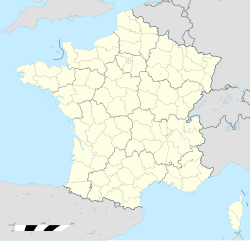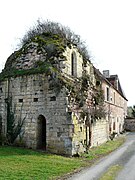Dalon Abbey
Abbaye de Dalon | |
 The ruins of Dalon Abbey | |
| Monastery information | |
|---|---|
| Other names | Dalona (Latin) |
| Order | Benedictine Cistercian (since 1162) |
| Established | 1114 |
| Mother house | Pontigny Abbey |
| Diocese | Roman Catholic Diocese of Périgueux |
| People | |
| Founder(s) | Gerald of Salles |
| Abbot | Jean-Marc de Royère (commendatory abbot) |
| Architecture | |
| Heritage designation | Historic Monument (No. PA00082905) |
| Designated date | 1948 |
| Site | |
| Location | Sainte-Trie, Dordogne, France |
| Coordinates | 45°16′25″N 1°13′31″E / 45.27361°N 1.22528°E |
Dalon Abbey (Latin: Dalona;[1] French: Abbaye de Dalon; Occitan: Abadiá de Dalon) is a former Cistercian monastery in Sainte-Trie, Dordogne, southwestern France. It is listed as a Historic Monument.
History
Dalon Abbey was founded in 1114 by Gerald of Salles (or Salis) under the Rule of Saint Benedict thanks to donations by Gerald of Lastours and his brother Gouffier, who attended the abbey's foundation day alongside Eustorge, the Bishop of Limoges, and several local lords. The successor of Gerald of Salles, the hermit Roger, developed the abbey and established several monasteries and priories (Aubignac, Bœuil, Loc-Dieu, the Palais Notre-Dame, Prébenoît), thereby forming the Order of Dalon.
In 1142, Dalon was not a Cistercian community, but several other abbeys had already adopted the Cistercian Rule.[2] On that year, Stephen of Obazine, abbot of Obazine, followed the advice of Aymeric, bishop of Clermont, and requested Roger to send monks to introduce the Rule in Dalon.[3]
Upon Roger's death in 1159, the monks of Dalon requested the general chapter of Pontigny to send other instructors, since both orders were following the same Benedictine rule.
In 1162, just after the election of the third abbot, Dalon joined the Order of Cistercians alongside its daughter houses Bœuil, Bonlieu, Loc-Dieu, le Palais and Prébenoît. Dalon became the third daughter house of Pontigny and received protection from Henry Plantagenet, Eleanor of Aquitaine and Richard the Lionheart. The well-known troubadour and lord of Hautefort Bertran de Born withdrew as a monk into Dalon and died there in 1215.[4]
Dalon Abbey owned several granges in Périgord, as well as the Priory of Saint-Blaise in the parish of Milhac. Moreover, the order founded the bastide of Puybrun in the Quercy region.[5]
In the 17th century, the remains of the abbey (the monks' building, the chapter house and the two chapels of the right-hand side of the transept) were integrated into the northern side of the newly-established dwellings.[6]
In 1784, the Bishop of Castres, Jean-Marc de Royère, was appointed as commendatory abbot of Dalon.[7] Since the late 18th century, Dalon Abbey has been located in the department of Dordogne in the commune of Sainte-Trie. It is now private property.
According to Janauschek, Dalon Abbey had the Order number CCCLXXV (375).[1]
On 27 September 1948, the dwellings, the chapter house and the dovecote were listed as a Historic Monument.[6]
Gallery
-
The ruins adjacent to the dwellings
-
The remains of a column
-
The remains of a capital
-
The dwellings
-
The dovecote
See also
References
- ^ a b Janauschek, Leopold (1877). Originum Cisterciensium: in quo, praemissis congregationum domiciliis adjectisque tabulis chronologico-genealogicis, veterum abbatiarum a monachis habitatarum fundationes ad fidem antiquissimorum fontium primus descripsit (in Latin). Vol. I. Vienna: Puthod. p. 240. Retrieved 11 April 2013.
- ^ de Pierrefitte, Abbot J. B. L. Roy (1857). Études historiques sur les monastères du Limousin & de la Marche (Google Books) (in French). Vol. 1. Guéret. p. 16. Retrieved 2 December 2018.
{{cite book}}: CS1 maint: location missing publisher (link) - ^ de Pierrefitte, Abbot J. B. L. Roy (1857). Études historiques sur les monastères du Limousin & de la Marche (Google Books) (in French). Vol. 1. Guéret. p. 15. Retrieved 2 December 2018.
{{cite book}}: CS1 maint: location missing publisher (link) - ^ Penaud, Guy (1999). Dictionnaire biographique du Périgord (in French). Éditions Fanlac. p. 139. ISBN 2-86577-214-4.
- ^ Aubarbier, Jean-Luc; Binet, Michel; Mandon, Guy (1987). Nouveau guide du Périgord-Quercy (in French). Ouest-France. p. 351. ISBN 2-85882-842-3.
- ^ a b Base Mérimée: Abbaye de Dalon, Ministère français de la Culture. (in French)
- ^ Jean, Armand (1891). Les évêques et les archevêques de France depuis 1682 jusqu'à 1801 (in French). Alphone Picard (Paris), G. Fleury et A. Dangin (Mamers). p. 502. Retrieved 2 December 2018.
Further reading
- Devaux, Pauline (2005). Occupation médiévale du sol du pays d'Hautefort et de la forêt de Born (in French). Hautefort: Association "Hautefort notre patrimoine".
- Lewis, Andrew W. (June 1995). "Six Charters of Henry II and his family for the Monastery of Dalon". The English Historical Review. 110 (437): 652–665. doi:10.1093/ehr/CX.437.652.
- van Mieghem, Madeleine (1976). L'abbaye cistercienne de Notre-Dame du Dalon de 1790 à 1814 (in French). Imprimerie SEIC 24160 Clairvivre.
- Grillon, Louis (1964). Le domaine et la vie économique de l'abbaye cistercienne de Notre-Dame de Dalon en Bas-Limousin (in French). Bordeaux: dissertation.
- Laussac, Jean-Pierre; Grillon, Louis (2003). "L'abbaye de Dalon sous les abbés commendataires François et Louis de La Fayette (1634-1729)". Revue des Lettres, Sciences et Arts de la Corrèze (in French). 106: 349–369.








